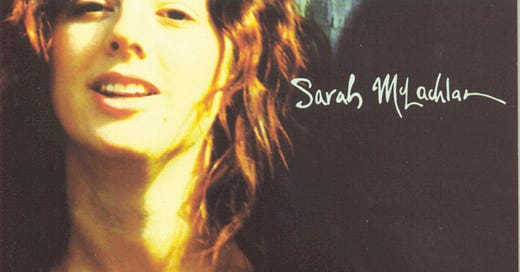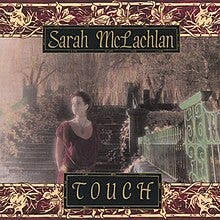Let me throw down the mother of gauntlets as I start this piece.
Of all the bands and artists I’ve seen perform live over my fifty years of life, no one has ever exceeded Sarah McLachlan in intensity and performance. And, yes, I’m comparing her to Rush, to Yes, to Tears for Fears, to Neal Morse, to Kansas, and to a whole host of others. I’ve seen McLachlan numerous times, and I’ve yet to see anyone give as much as she does in performance.
She gives every single thing she has, and she always has.
There. The gauntlet has been thrown down
Sadly, too many readers—and, undoubtedly, progressive rock readers—know her for her rather sappy and quasi ideological songs from the late 1990s and after.
Yet, to look at her first three studio albums is to see an artist as artist, an artist before the fame, an artist who knew and loved the art, an artist who simply wanted to become one with her art. No angels, no building mysteries, and nothing fallen. Just pure intensity--an artist, her heart, her soul, her words, her bandmates, her engineer, and her producer.
McLachlan’s first album, 1989’s TOUCH, remains a delicate masterpiece, fragile yet held together invincibly by sheer force of honesty. Just in her 20s, she already offered the Canadian equivalent of Mark Hollis on this album, full of proggy pop worthy of XTC and Tears for Fears. Indeed, TOUCH—with its piano and 12-string guitars—might very well have been the perfect mix of Hackett-era Genesis and later Talk Talk. Though each song on TOUCH is a pop song, the album as a whole is a prog album, having created the most coherent and unique of atmospheres.
While not as coherent or atmospheric as TOUCH, her second album, 1991’s SOLACE is still a thing of beauty. Beginning with the quirky—reminiscent of Dead Can Dance—“Drawn to the Rhythm,” SOLACE’s first half resembles its older sibling only in the distinctiveness of McLachan’s voluptuous vocals. Too many of the world music touches feel forced, unfortunately, especially during the first half of the album.
By the time SOLACE reaches the second half, beginning with “Back Door Man,” and continuing with “Shelter,” “Black,” “Home,” and “Mercy,” there is no stopping this album. As uneven and forced as side one is, side two is spectacular, a true sequel to the superior TOUCH. Though a clear echo of Talk Talk’s SPIRIT OF EDEN, McLachlan’s “Mercy” is one of the best songs of the past thirty years. Raw, earnest, and yearning, it calls us to find our better nature. Even the lyrics reflect the sublime: “you lie there on the swollen ground/deserted in your heart/still long for what yesterdays lost.” The album, tellingly, reveals with a rousing cover of Donovan’s “Wear Your Love Like Heaven.”
Whatever misdirection, she took with the first half of SOLACE, McLachlan rectified all wrongs with her third album, a pure and simple (well, not simple in the least) masterpiece of proggy pop, 1993’s FUMBLING TOWARDS ECSTASY. This album has played in constant rotation in my life for a quarter of a century, and it has never once gotten old. For me, it ranks up there with SELLING ENGLAND BY THE POUND, CLOSE TO THE EDGE, SONGS FROM THE BIG CHAIR, HOUNDS OF LOVE, and THE UNDERFALL YARD. Yes, it is that good.
Far more mature (in all the good and bad that goes with maturity) than TOUCH but far more cohesive than SOLACE, FUMBLING brings together everything perfect in McLachlan’s song writing. It creates the atmosphere of TOUCH without the unevenness of SOLACE. Each song individually is a clever pop song, but, then again, as with TOUCH, the overall feel of the album is purely prog, Hackett-era Genesis meets Mark Hollis, Phil Brown, and Tim Friese-Greene in London, 1991.
The album begins with the upsetting and creepy, “Possession,” the true story of a fan who followed McLachlan incessantly, writing her letter after letter, hoping to hold and suffocate her in his love. The second track, “Wait,” slows things way down, but offers some really nice bass and drum work, with lyrics dealing with those who prey upon the hopeful and creative. Yes, the album is still rather gloomy. “Plenty,” however, picks up the tempo again, giving us a soft build as we enter a world of false and deceptive abundance, the guitars, especially, having a U2-Edge feel for a moment, before breaking into a Tony Levin bass.
An earnest guitar opens track four, “Good Enough,” a love song that might or might not be about lesbianism. As with the guitar, the song is as earnest as it gets, as two women open up to one another.
“Mary” sounds the closest to SOLACE, a self-contained pop song about confusion in thought and action.
The first half of FUMBLING ends in the piano-driven and slow jazz “Elsewhere,” a song, once again, about reticence and insecurities, along with longings and desires. “I’m drunk in my desires,” McLachlan croons.
A bit of 90s studio trickery—the sound of McLachlan’s voice as a ping-pong ball—begins track seven, “Circle,” the first song of the second half of FUMBLING. Jealousy and anger pervades the song as McLachlan asks if the virtue of fortitude is a curse when it comes to love.
While there’s not a weak track on the album, “Ice” is, by far, of the two best tracks on the album. Indeed, it would be difficult to find a song in the rock era to match the genius of “Ice.” Though it might be read, lyrically, as a song of regret in the style of the previous songs on FUMBLING, “Ice” takes everything up to and beyond 11. “Tied to this bed of shame. . . .” In a way that only McLachlan can, one can feel the forbidden elements of physical love, knowing that one’s partner is there only for the enjoyment and nothing more. The question—“at what point does something consensual become abuse?”—hovers over the entire song, itself filled with SPIRIT OF EDEN woodwinds. At one point in the song, the listener must ask if one is sharing a bed with a person or a demon. If there’s ever been a song more confessional, I’ve not encountered it.
“Hold On” brings things up again, but only in tempo. The song deals with a child dying—fighting and struggling against all the powers and principalities of death, but failing, as the child’s parents watch in horror. “Hold on,” McLachlan cries. “This is going to hurt like hell.” Should another day dawn, “we will praise it.” Never has a song more politely and justly raged at the injustice of God’s Providence. Even after twenty-five years, I can’t listen to this song without pure and raw emotion. As a parent who has lost a child, I have no idea how young Sarah McLachlan captured the pain so perfectly. But, she did.
The tenth track, “Ice Cream,” is a frivolous joy, a song of child-like triumph, a whimsical love song that’s not whimsical in the least. “Your love is better than ice cream, better than anything else that I’ve tried.” After “Hold On,” “Ice Cream” might very well give the listener whiplash.
In case you thought McLachlan might have descended into triviality, worry not. “Fear”—track 11 of FUMBLING—is not only the best song of the entire album, it is McLachlan’s greatest contribution to music. “Morning smiles, like the face of a newborn child.” Horribly, tragically, and tastefully, the song deals with insecurities, especially in love. “I fear, I fear I have nothing to give. I have so much to lose here, in this lonely place.” As with “Ice,” one must wonder if one’s lover is a person or a demon, as the song comes very close to describing abuse, bordering on out-and-out rape. “Wind in time, rapes the flower trembling on the vine, and nothing leads to shelter.” This is truly McLachlan’s masterpiece, as her voice perfectly mixes with the strings and keyboards, creating an atmosphere that is once enticing and suffocating. When I first heard this song, I thought there was no way the human voice could do what McLachlan’s did on this song. Having seen her several times in concert, I can assure the reader, there’s no trickery in this. This is pure McLachlan, and her voice can do this at age 25 and at age 49.
“Fear” is the true climax of the album, as the final track, “Fumbling Towards Ecstasy,” is not just the title track but exactly what it states to be. . . a kind of final sigh after forty-five minutes of break-neck intensity. One can readily imagine the end titles rolling as this song plays. “All of my fears have left me now. . . .”
Like McLachlan, I’ve given what I have in this review. Over a quarter of a century ago, she created a pop/proggy masterpiece. It belongs in every music lover’s collection, to be cherished, to be appreciated, and, simply, as a reminder that there are artists who create for the sake of singing to the spheres and to allow one human soul to speak to another—across time, across space, and across all particularisms. Sweet surrender.







Ok, you've convinced me to check out her stuff. I confess I only know "Angel". I do love some Tears for Fears, XTC, and Kate Bush.
Fumbling was my intro to McLachlan, and I still like it. It's always good to get your thoughts on artists you love, Brad!